- Bernard Preston homepage
- Our green garden
- Musings From the Summer Vegetable Garden
Musings from the summer vegetable garden
These musings from the summer vegetable garden bring great tidings; not just a wonderful feast but also a thankful heart to God. The table is laden with good food and my cup runneth over with Catawba grape honey mead.
Gardening never fails to fascinate me for many reasons. Not least is that every season is quite different; and one year varies from another. This has been a summer of heavy rain and mostly cool temperatures; our woodstove was kept busy right up until Christmas.
The fruit and veg are late; but a dozen blueberries straight from the bush are the order of every breakfast as I pen this blog. They go so well on wholemeal grits; with all the bran and germ these carbs actually help us to lose weight. It's the refined starches that we should be fearful of.
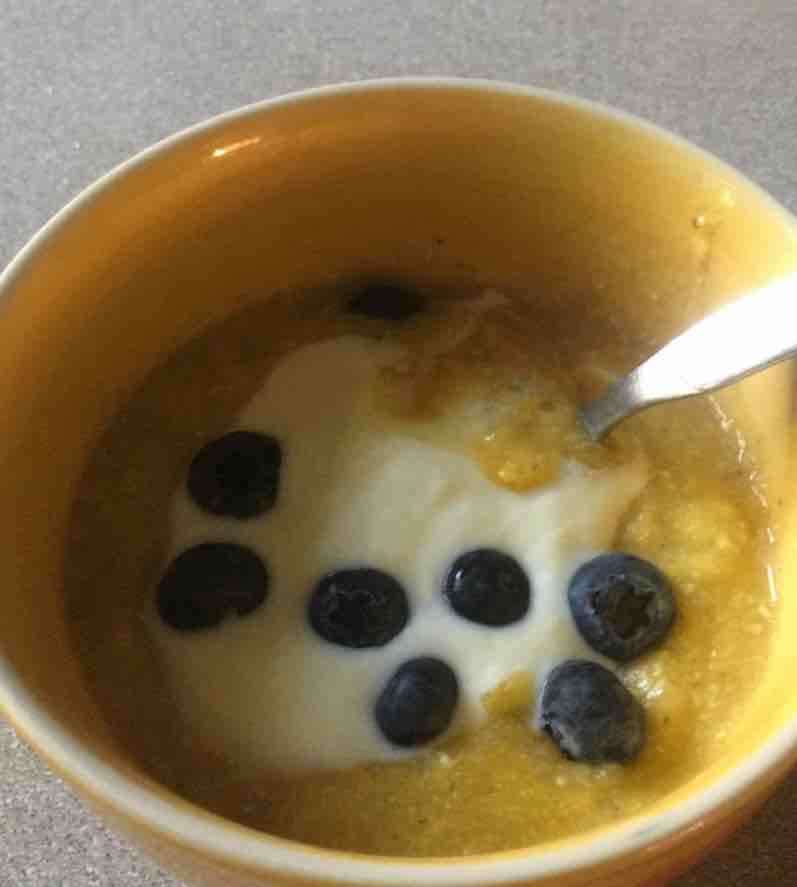
Last year we had our first susu on New Year’s Day. Now we have only a profusion of vines, tendrils and flowers; not even one tiny fruit to be seen, though two were found latterly lurking in the fronds.
Susus are a staple at Our Green Home; we enjoy the subtle flavour and abundant nutrition virtually every lunch for six months. They are particular rich in beta-carotene, the precursor of vitamin A; a deficiency causes nearly half a million kids worldwide to go blind annually. One cup also contains about 10% of the protein needed by a growing child.
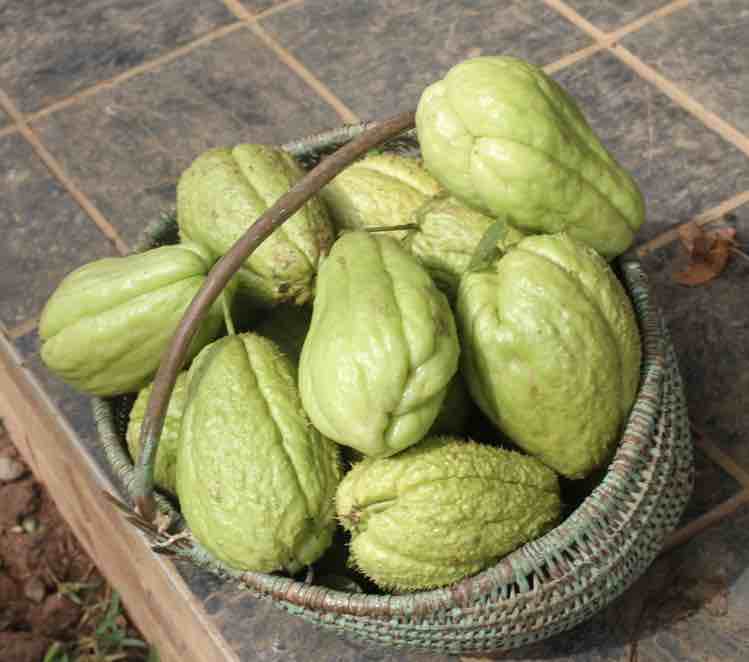
The susu is also known as chaote squash in much of the world.
The butternut too are way behind; plenty of growth and flowers giving promise of another huge harvest out of the compost heap but not even one little gourd yet. Gems, zucchini and cucumbers are bearing prolifically.
One giant gem squash has boggled our minds. It is 14cm in diameter, tender and delicious; enough for four meals. It’s astonishing what the humic acid in compost can do.
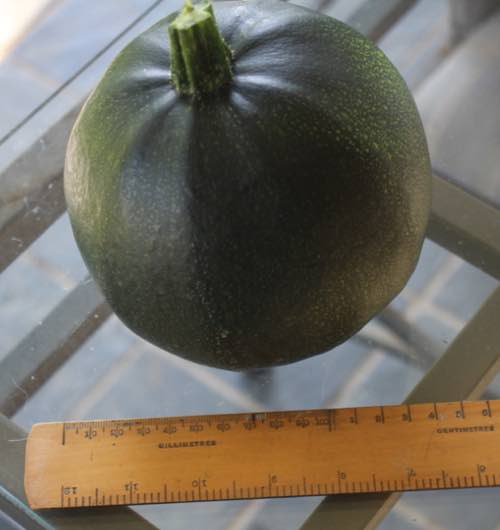 Not seen before in 40 years of gardening
Not seen before in 40 years of gardeningMost years we have gooseberries every single day but they are few and far between; especially after sharing them with the toppies which does not aggrieve me.
But the granadillas are falling from the vines like pennies from heaven; they love all the rain with a few days of hot sun to ripen the fruit. Each one contains 2 grams of fibre; only 5% of those enjoying typical grocery store food get the recommended daily amount with disastrous consequences for the bowels and general immunity. It is little wonder the recent pandemic hit so hard.
Tens of thousands of tiny cherry guavas are forming with the promise of my favourite mead and the best jelly ever.
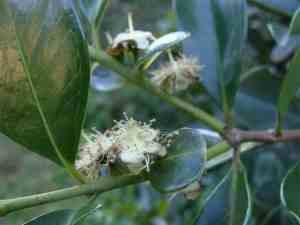 Cherry guava flowers
Cherry guava flowersThe oranges are nearly over but we are still enjoying the odd lemon and lime; remember citrus is rich in the only proven nutrient to help prevent dementia; called beta-cryptoxanthin. But we are still enjoying an avocado a day. Soon they will be finished too and we’ll have to wait until May for the new crop. Right now they are selling for around R20 in the supermarket.
We estimate that our green garden produces at least R100,000 of fruit and vegetables annually. It blows my mind that less than 20% of South Africans grow any food whatsoever.
Always wear a broad-brimmed hat to protect your nose and ears; it can make a useful receptacle for garden produce.
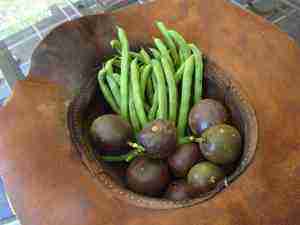 My leather gardening hat comes in useful
My leather gardening hat comes in usefulThere is strong research reported this week in “Two Minute Medicine” that high fruit intake is associated with a lower incidence of T2D, probably the greatest health challenge of our time. Each 100 g/day higher intake, say 7 granadillas, is associated with a 2.8% reduced risk of diabetes.
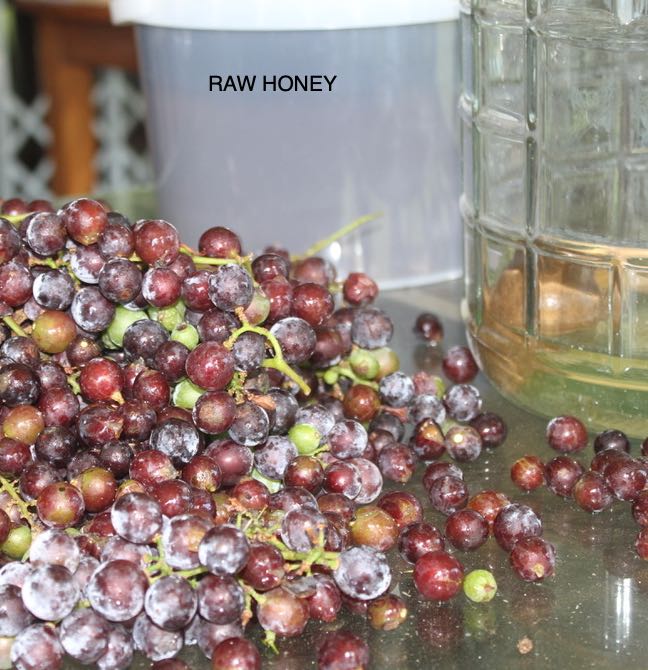 Catawba grapes in readiness for brewing honey mead
Catawba grapes in readiness for brewing honey meadNever before have we had a crop of spuds like this year; despite the rain they haven’t been affected by blight. Nearly half a ton of new potatoes is expected; they are not fattening like those from cold storage.
The mealies are looking good too though “One Chomp Stealth” is frustrating me. He takes a bite out of each tiny unformed cob before throwing it down in disgust; the vervet monkeys are threatening to destroy the whole crop for both us and themselves. Regular patrols with the paintball gun are the order of the day.
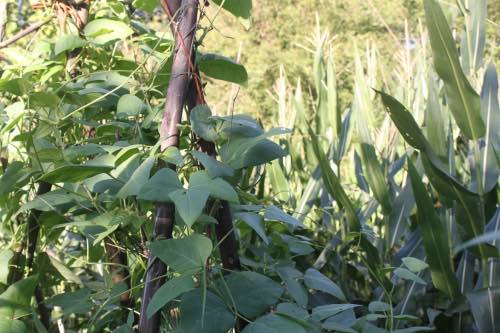 Corn and lima beans in the garden give the promise of succotash
Corn and lima beans in the garden give the promise of succotashRows of radishes, the first year we have had any success with okra and a
mountain of greens add to the abundance. Spinach, oxalates and kidney stones have in the past confused all the doctors; at last the research reveals the truth.
Fresh pole beans daily and huge vines of limas give promise of masses of vegetable protein for autumn and winter; and succotash.
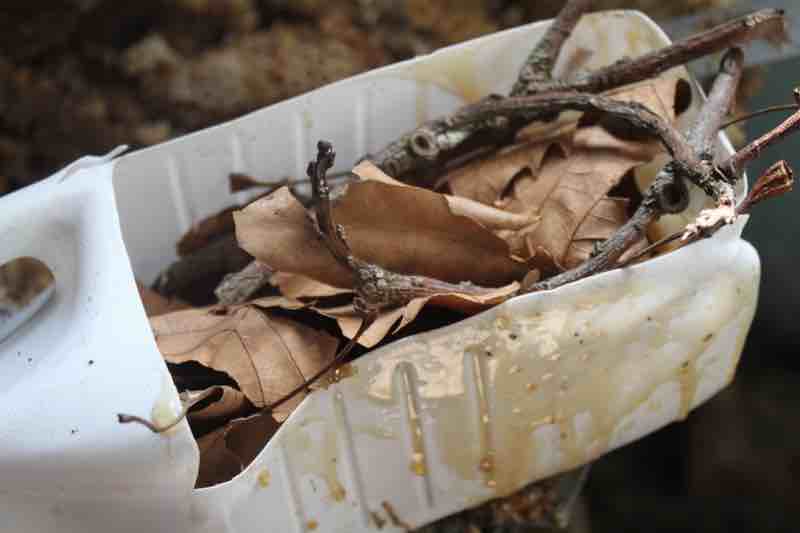 Bees are fed in a dearth with a mixture of honey, sugar and water
Bees are fed in a dearth with a mixture of honey, sugar and waterFresh organic eggs and unspoiled honey are daily on the table. I’m glad I am not a vegan. And for the record we are very careful not to exploit our pets; they are well cared for.
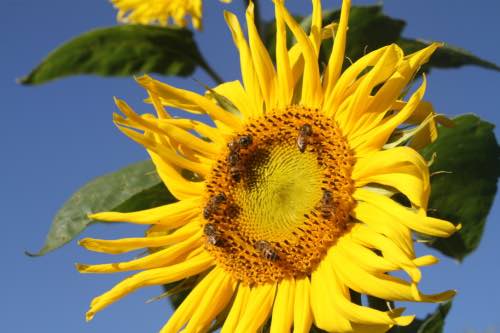 Bees feeding hungrily on a sunflower
Bees feeding hungrily on a sunflowerThe purpose of this column is not to boast about Our Green Garden. It is simply to state clearly that a mountain of nutritious food can be grown in every suburban backyard. Our motto is, don’t buy your fruit and veg, grow them. We collect most of our own seed so the only real cost is the sweat off your brow.
Of course we do buy some food; mainly dairy, olive oil and chickpeas. Having a horror of feedlots we are turning into flexitarians; organic red meat where possible, perhaps once a week. It’s more expensive, of course but we eat so little.
"There is increasing evidence that exposure to plants and green space and particularly to gardening, is beneficial to mental and physical health."
- Clinical Medicine (PMC6334070)
People garden for different reasons; some just for the love of nature and seeing things grow. For others the only food on the table is what they sow and reap. Fearful of the cancer and Parkinson's Disease associated with herbicides, many are turning to their own fruit and veg.
Interestingly there is now proof that sprouting broad beans gives protection against this nasty neurodegenerative disease.
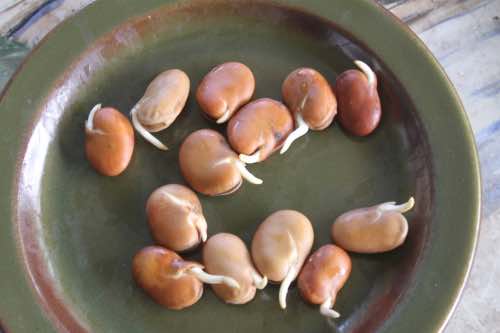 Protection against the fastest growing neurodegenerative disease
Protection against the fastest growing neurodegenerative diseaseWe just think the taste of our own freshly-picked organic fruit and veg makes it all so worthwhile.
There is strong research that gardening is healthy; fewer visits to the doc and less meds. The exercise beats resistance training at the gym. No vitamin D supplements are necessary but a good floppy hat is always wise obviously. The extra fibre makes for a happy tum, feeding a flourishing microbiome of friendly bugs.
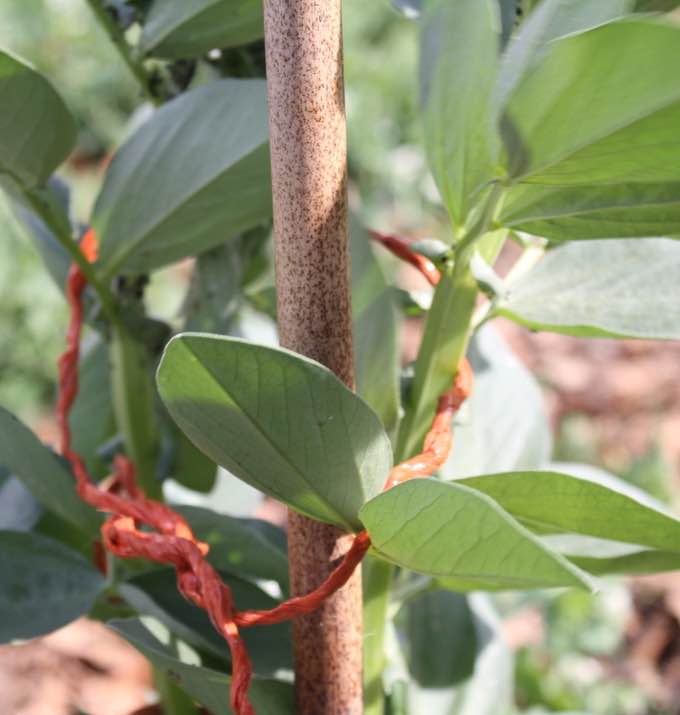 Broad beans must be staked
Broad beans must be stakedIf you’re thinking of getting started, February and March are the months for sowing the winter garden. Get the plants established before the cold sets in. I recommend as many different kinds of greens as you can; broad beans and peas for protein. Plan where you could place fruit trees; a grafted avocado, a lemon and a mulberry perhaps.
Most important is the compost heap; all the kitchen waste, grass mowings and prunings.
We are experimenting with raised garden beds. They are permanent compost heaps; no need to open and turn them.
A very conservative estimate reckons that our old Hass avocado tree has produced nearly 10,000 fruit. I leave you to work out the value of that at today's supermarket prices.
We’ve never tottered it up but we reckon our green suburban garden makes a huge contribution to the monthly budget. Just a thought if you are feeling the pinch.
Is it time to start considering your own musings from the summer vegetable garden?
Musings from the summer vegetable garden
These musings from the summer vegetable garden do bring great tidings; there's a mountain of food to be had for all those willing to shed a little sweat growing beans, granadillas and potatoes, for example. This is not a page about religion but there is joy, a veritable feast to be shared with friends, family and yes, the poor too.
- Prue Leath's unpredictable garden
- Gardening for health @ Clinical Medicine
When browsing use right click and "Open Link in New Tab" or you may get a bad gateway signal.
Newsletter
Our newsletter is entitled "create a cyan zone" at your home, preserving both yourself and Mother Earth for future generations; and the family too, of course. We promise not to spam you with daily emails promoting various products. You may get an occasional nudge to buy one of my books.
Here are the back issues.
- Lifestyle and ideal body weight
- What are ultra-processed foods?
- Investing in long-term health
- Diseases from plastic exposure
- Intensive lifestyle management for obesity has limited value
- A world largely devoid of Parkinson's Disease
- The impact of friendly bacteria in the tum on the prevention of cancer
- There's a hole in the bucket
- Everyone is talking about weight loss drugs
- Pull the sweet tooth
- If you suffer from heartburn plant a susu
- Refined maize meal and stunting
- Should agriculture and industry get priority for water and electricity?
- Nature is calling
- Mill your own flour
- Bake your own sourdough bread
- Microplastics from our water
- Alternative types of water storage
- Wear your clothes out
- Comfort foods
- Create a bee-friendly environment
- Go to bed slightly hungry
- Keep bees
- Blue zone folk are religious
- Reduce plastic waste
- Family is important
- What can go in compost?
- Grow broad beans for longevity
- Harvest and store sunshine
- Blue zone exercise
- Harvest and store your rainwater
- Create a cyan zone at your home
Did you find this page interesting? How about forwarding it to a friendly book or food junkie? Better still, a social media tick would help.
- Bernard Preston homepage
- Our green garden
- Musings From the Summer Vegetable Garden
Address:
56 Groenekloof Rd,
Hilton, KZN
South Africa
Website:
https://www.bernard-preston.com